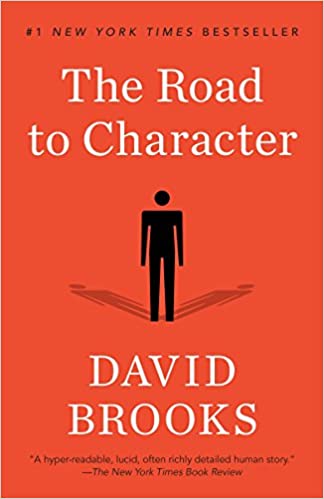Being aware of your characteristics and personality traits is crucial to becoming a happy person. This information about yourself is a dramatic predictor of your behavior and attitude. Of course, every person has a unique personality which is formed by their experiences and relationships.
Knowing what makes you, well, you—both the good and the bad—can result in your leading a life full of satisfaction, better decision-making, and success on a personal and professional level.
Today, we’re bringing you how to uncover the positive and negative traits of your inner character.

The Road to Character
by David Brooks
⏱ 15 minutes reading time
🎧 Audio version available
To start us off, let’s delve a little deeper into the difference between character and personality.
Each person has different aspects to their persona. Your personality is visible on the surface. Meanwhile, your character is developed and revealed over time through different situations.
People’s personalities are easy to read, and everyone’s an expert when it comes to this. That’s right. Everyone. That’s how easy it is to figure out the surface-level personality of others.
Pretty quickly, we judge people as extroverted, confident, funny, optimistic, just as much as we judge people as introverted, lazy, and pessimist. If that judgment isn’t formed by the time you meet that person, then your opinion forms after. Give or take a few interactions, that person reveals their personality traits.
Character…now that’s what takes a lot more time to figure out. It’s hard to discern someone’s character, especially if they’re good at hiding it.
Character traits include social intelligence, gratitude, grit, honesty, trustworthiness, respect, et cetera. It’s learned behavior rather than your inborn traits. This determines what type of person you are.
Uncovering the positive and negative traits in yourself has never been easier, and many tests that help you identify these traits exist in abundance. You can choose from over 2,500 personality tests in the U.S. alone, but that doesn’t mean they will all help you find out what you want. Here is how you can tell on your own.
Look back at your history. This is a good starting point. Remember that character is molded by past experiences and learned behaviors.
Think about situations and how you reacted to them. What are the things that you have done that you’re proud of? Have you done well in your life? The answers to these questions are your first clue. Can you say that you’re brave or hesitant in emergencies? Do you make promises and follow up on them?
In order to discover positive traits about yourself, focus more on the good things about you and your life. This includes both your thoughts and actions.
Do you often give out sincere compliments? Smile? Say thank you? If you want to delve deeper into this aspect of yourself, write a list of the good deeds you do every day. Therefore, you can stay focused on being good, andthe list will serve as a reminder for whenever you feel negative.
Now that we’re done with the past, it’s time to explore new experiences! The more you experience things, the more you’ll learn about yourself. Because character is more easily subject to change, changing your perception of the world can change your character for the better.
Ask someone who knows you well. Look for an unbiased opinion if you truly want to dig deep into both sides of your inner character. Ask someone who knows you well—a trustworthy family member or friend—and they may mention things you didn’t notice before.
Now, let’s figure out just how much of a mentally strong person you are. Do any of the following behaviors sound like you?
Mentally strong people possess these traits: they don’t feel sorry for themselves. They would rather take responsibility for their actions and mistakes.
Mentally strong people are present and make plans for the future. At the same time, they’re flexible.
Pleasing everyone around them isn’t their priority. And while they’re kind, respectful, and fair, they understand that they can’t make everyone around them happy.
Do you acknowledge your mistakes? And when faced with similar situations again, do you try to make better decisions?
Do you display a gracious attitude when it comes to others’ success? Can you appreciate them and even celebrate their success without negatively comparing it to your own?
After life knocks you down, you don’t give up after a failure. Instead, you’re willing to keep at it until you get it right.
When a problem suddenly arises—whether that’s in your personal life or at work—do you give up quickly? How much tenacity do you display when faced with hardships?
Confidence is another key trait of your inner character. And it goes both ways. Do you believe in your abilities and talents? How much?
Do you see yourself as an optimistic person? That the odds are in your favor? Or do you tend to think that the world is against you?
Do you own up to your mistakes by taking responsibility?
The last positive trait of inner character is probably one of the most important, and that is—focus on this one—self-awareness.
Now, it’s easy to look at these positive, picturesque traits and say, “Sure, that applies to me.” But it’s way harder to discover your negative traits. Here is a trick to uncovering them.
When you look at others, which qualities in themmake you angry? An odd thing about human psychology is that we get triggered by seeing qualities we don’t like about ourselves in others, so we tend to judge them more harshly or even hate them. Let’s break down negative traits even further.
Pessimism
Pessimism is one of the major and abundant negative traits in many people. To discover how pessimistic you are, think about this: who are you surrounded with in the first place?
People with positive mindsets or the opposite? When times get tough, do you only feel acceptance that the worst is yet to come and only see the negative side of the situation?
Judgment
A negative trait that exists in almost everyone is the double-edged sword that is being judgmental. It’s because we, whether we know it or not, recognize the traits we dislike about ourselves in others and resent them for it.
However, what this does is waste your time and energy, as well as harm that person’s feelings and self-esteem.
Procrastination
Next up is procrastination. This is one negative trait that’s easily identifiable. Procrastination happens whenever we feel too lazy to complete a task and constantly postpone it to the next day. Even if that task, should it be a book report or a chore, is easy, tedious, or even with a far deadline, we still procrastinate doing it.
These are only surface-level negative traits, which bring us back to self-awareness and how much it matters.
Before we finish, we would like to mention that these traits that you have uncovered are a part of you—and that means that you shouldn’t shy away from the word “negative.” These qualities that you view as “bad” or “good” are often just expressions and criticisms of our own thoughts and fears. Once you own up to these traits, you discover how they can benefit you.
Let’s take being “lazy” as an example. When you own up to a “negative” trait such as being lazy, that doesn’t mean you will procrastinate things for the rest of your life. Rather, it means you know enough to figure out how to move forward and live a more balanced life.
This self-awareness gives you the freedom to choose how you behave instead of going by your learned instincts—or should we say, act on autopilot. Once you take charge and empower yourself, you’ll stop stumbling through life and social interactions and start navigating the world on your own terms. It’s time that you take charge of your character!
What Is Snapreads?

With the Snapreads app, you get the key insights from the best nonfiction books in minutes, not hours or days. Our experts transform these books into quick, memorable, easy-to-understand insights you can read when you have the time or listen to them on the go.


